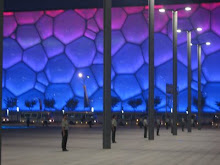When people think about China, people think communism. People think about the government limiting opportunities for people. And before I traveled to China for the first time, I thought the same. To my surprise, from what I experienced, it's far from that.
The Chinese people and government are quickly catching on to the ability to make money off of just about anything. Ninety percent of the historical places I visited charged an admission that was a decent amount for Chinese people. People are renting bikes for tourists to ride around the city. People are manning newspaper stands to sell noodles, Gatorade and cigarettes.
I think what I experienced was a country that is becoming more and more Western. The Western influence as it relates to business operations is very visible. For some people in the Western part of the world, that's scary. Some experts have talked about China becoming a superpower in the capitalism realm. With the progress I witnessed in a country many people thought would be far from Western for a long time, I wouldn't be surprised if it was a dominant player in the world of capitalism in the next 50 years.
Tuesday, September 30, 2008
Tuesday, September 16, 2008
Labor Surrounding the Olympics
The volunteer system the Beijing Organizing Committee set up for the 2008 Beijing Olympic Games was A LOT different than anything I have experienced in America.
Many of the paid volunteers were working on-site at the venues at least a year before the Games ever began. And I am talking about basic-level management positions for simple operations at venues. For instance, the manager of the "pigeon holes" at the Laoshan Velodrome will have worked for about 14 months at the venue at the completion of the Paralympic Games. Pigeon holes are essentially boxes that hold any releases published by the Olympic News Service at that venue. The manager had about 10 people working for him and the coordination of this pigeon hole operation would take no more than two weeks of planning. Yet, he will have worked about 14 months on this task.
It was clear that the mindset as it relates to the paid volunteers was the same across the board. It didn't matter that the pigeon hole operation took less time than the coordination of the Opening Ceremony. The two would put in the same amount of time. I don't know if that is exactly the case hours wise, but the thought process was similar for the two. And the result was a lot of napping. Napping and small-group games were the solutions for many of those paid volunteers to pass the time.
Also, it was evident that the organizing committee demanded devotion from these volunteers when it wasn't necessary. The Laoshan Velodrome had showers built in - not for athletes - but for volunteers. In my time there, I never would have found it necessary to shower there. On top of that, there were instances that I was told of volunteers taking sleep bags to the venues and staying overnight. I think the intentions of the organizing committee were good. It wanted the Olympics to go as smoothly as possible but the use of paid volunteers was much different many Western cultures. And in fact, in one conversation I had with the pigeon hole manager I mentioned above, he emphatically told me he would be telling someone after the completion of the Games that what they demanded of him was unfair.
Many of the paid volunteers were working on-site at the venues at least a year before the Games ever began. And I am talking about basic-level management positions for simple operations at venues. For instance, the manager of the "pigeon holes" at the Laoshan Velodrome will have worked for about 14 months at the venue at the completion of the Paralympic Games. Pigeon holes are essentially boxes that hold any releases published by the Olympic News Service at that venue. The manager had about 10 people working for him and the coordination of this pigeon hole operation would take no more than two weeks of planning. Yet, he will have worked about 14 months on this task.
It was clear that the mindset as it relates to the paid volunteers was the same across the board. It didn't matter that the pigeon hole operation took less time than the coordination of the Opening Ceremony. The two would put in the same amount of time. I don't know if that is exactly the case hours wise, but the thought process was similar for the two. And the result was a lot of napping. Napping and small-group games were the solutions for many of those paid volunteers to pass the time.
Also, it was evident that the organizing committee demanded devotion from these volunteers when it wasn't necessary. The Laoshan Velodrome had showers built in - not for athletes - but for volunteers. In my time there, I never would have found it necessary to shower there. On top of that, there were instances that I was told of volunteers taking sleep bags to the venues and staying overnight. I think the intentions of the organizing committee were good. It wanted the Olympics to go as smoothly as possible but the use of paid volunteers was much different many Western cultures. And in fact, in one conversation I had with the pigeon hole manager I mentioned above, he emphatically told me he would be telling someone after the completion of the Games that what they demanded of him was unfair.
Subscribe to:
Posts (Atom)




